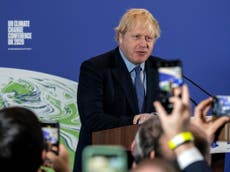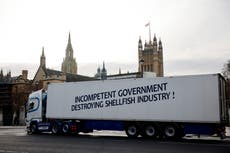The Environment Bill is fundamentally flawed – too weak and unenforceable
The Environment Bill presents a perfect opportunity for the government to show it is serious about the climate crisis but early signs do not look good


Your support helps us to tell the story
From reproductive rights to climate change to Big Tech, The Independent is on the ground when the story is developing. Whether it's investigating the financials of Elon Musk's pro-Trump PAC or producing our latest documentary, 'The A Word', which shines a light on the American women fighting for reproductive rights, we know how important it is to parse out the facts from the messaging.
At such a critical moment in US history, we need reporters on the ground. Your donation allows us to keep sending journalists to speak to both sides of the story.
The Independent is trusted by Americans across the entire political spectrum. And unlike many other quality news outlets, we choose not to lock Americans out of our reporting and analysis with paywalls. We believe quality journalism should be available to everyone, paid for by those who can afford it.
Your support makes all the difference.The UK is now out of the EU and we have lost many of the environmental protections that came with membership. If we are to avoid any risk of a return to being the “dirty man of Europe”, those protections urgently need to be restored and strengthened.
The UK is one of the most nature depleted countries in the world. In the course of my lifetime, populations of some of our most important wildlife have plummeted by over a half, and the situation is getting worse. According to the RSPB, the government is failing to meet 17 out of 20 UN biodiversity targets. This must be reversed, fast.
The Environment Bill presents a perfect opportunity for the government to show it means to follow through on its pledge to “be the first generation to leave the environment in a better state than that we inherited”.
Early signs do not look good. As currently worded, the Bill would allow action to be put off until it’s too late. There needs to be a mechanism for making sure new targets are put in place immediately, and to make interim targets legally binding, so that we don’t wait until the natural world collapses even further before anything is done about it.
The Bill enshrines five important environmental principles in law, including “polluter pays”. However, as currently drafted, the secretary of state needs only to pay “due regard” to an as yet unpublished policy statement on these principles, rather than to “act in accordance with them”. That means their legal status is weaker than when we were members of the EU – despite all those assurances that there would be a “Green Brexit in which environmental standards are not only maintained but enhanced”.
Moreover, the principles don’t apply to all public bodies, and – astoundingly – two critical ministries, the MoD and the Treasury, are completely exempt, even though it is economic decisions which often drive environmental destruction.
Then there is enforcement. The Bill sets up a new Office for Environmental Protection to replace the enforcement powers that were previously provided by the European Commission. But if a watchdog is to have real teeth, it has to be capable of holding the government to account, with full independence and powers to prosecute and impose financial penalties. The OEP is not sufficiently independent, and thanks to a new clause inserted by the government at committee stage, can be “guided” by the secretary of state, which risks turning it into a lap dog.
There are plenty of other weaknesses in the Bill, from its failure to include a statutory deforestation target to the lack of an overall goal of halving the UK’s global footprint.
But there is a more fundamental flaw: that even the very best environmental policies will not be up to the job of protecting and restoring nature, unless we face up to the fact that our current economic model is broken, and set about fixing it. It is driving ecological breakdown, without delivering the wellbeing and basic support that people need – whether sufficient food, good health, housing or income.
A recent UN report on the state of nature explicitly identified the growth of the global economy, and in particular the growth of material consumption in wealthy nations, as one of the major driving forces behind the collapse of nature. There are countless other reports which say that endless economic growth is incompatible with tackling the climate and ecological crises.
The OECD issued a report last year warning that patterns of economic growth were now generating “significant harms” including “rising inequality and catastrophic environmental degradation”. It called for new goals for the economy that address today’s greatest challenges.
We need to abandon the focus on short-term profit and endless GDP growth as the key indicators of progress and focus on building a wellbeing economy where people’s needs are met within the Earth’s natural limits. We cannot continue depleting the Earth’s resources – whether forests, fresh water supplies, healthy soils or vital ecosystems – to drive economic growth, regardless of the impact on the health of the planet or the wellbeing of future generations.
The health and sustainability of the natural environment must be incorporated into national economic goals. This should be the benchmark against which all policy-making and key decisions are measured. The Treasury “Green Book” needs to be truly green.
Most important of all, we must drop GDP growth as the principal measure of progress. Our new economic goals should be measured against tougher environmental targets at home, the UK’s commitments under international agreements such as the Paris climate agreement, the wellbeing of future generations and the impact overseas of UK consumption and economic activity.
Others are already taking the lead on this. The Wellbeing Economy Alliance is a global collaboration of organisations, alliances and governments – and in 2018, New Zealand, Scotland and Iceland set up the Wellbeing Governments Initiative to pool ideas on how to improve the lives of people and the success of their countries overall. In 2019, New Zealand published its first Wellbeing budget where spending was allocated according to how it would contribute to a wellbeing economy.
It’s not enough to leave the environment in a better state than we inherited. We need to leave it in a state that will sustain people’s lives for generations to come. The way to achieve this is with an economy focused on wellbeing. The Environment Bill should be the starting point.
Caroline Lucas is the Green Party MP for Brighton Pavilion




Join our commenting forum
Join thought-provoking conversations, follow other Independent readers and see their replies
Comments